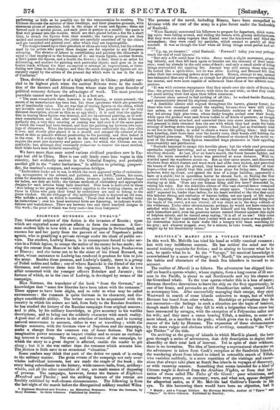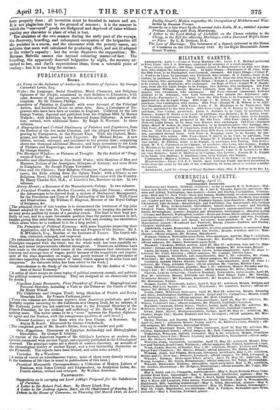MELVILLE'S MARDI AND A VOYAGE THITHER.* IN this work Mr.
Melville has tried his hand at wildly nautical romance ; but with very indifferent success. He has neither the mind nor the mental training requisite for fiction; and in aiming to become what he is not, be spoils what he is. In the "Voyage," his nautical knowledge is overwhelmed by a mass of verbiage ; at" Mardi," his acquaintance with the habits and characters of the South Sea islanders is turned to no account.
The outline of Mardi is as follows. The adventurer has shipped him- self on board a sperm-whaler, whose captain, from a long course of ill suc- cess in the Pacific, is about to sail Northwards and try his chance on the Greenland whale. To the true sperm-whaler this is a loss of caste; Herman therefore determines to leave the ship on the first opportunity, in one of her boats, and persuades an old Scandinavian sailor, named Jar!, to accompany him. After successfully managing their escape, they steer Westward in search of some islands unknown to maps, but of which Herman has heard from other whalers. Hardships or privations they do not encounter—the feelings in such a situation are the topic of interest, though made little of: but they fall in with a brigantine whose crew has been massacred by savages, with the exception of a Polynesian sailor and his wife; and they meet a canoe bearing Yillah, a maiden, to some re- mote island, as a sacrifice to the gods ; which gives rise to a fight, and a rescue of the lady by Herman. The expansion of these circumstances by the most vulgar and obvious tricks of writing, constitute "the Voy- age Thither" of the title. On arriving at the group of islands in which Mardi is placed, the hero goes through a series of adventures, that defy description to depict their absurdity or their total lack of interest. Yet in spite of their wildness, there is no invention. The idea of bestowing a supernatural character on the adventurer is taken from Cook's reception at the Sandwich Islands; the wandering about from island to island in ostensible search of Yillah, who vanishes suddenly, is a mere repetition of the visitings and excur- sions that always take place at South Sea islands in voyages of discovery, or with runaway seamen. Something that seems intended for a kind of Circean magic is derived from the Arabian Nights, or from that imi- tation of them called The Tales of the Genii: poor witticisms, and remarks even poorer, on currency, wars, and what not, appear designel
. for allegorical satire, as if Mr. Melville had Gulliver's Travels in In! eye. To this borrowing there would have been no objection, had it
* Mardi ; and a Voyage Thither. By Herman Melville, Author of " Typee " and "Omoo." In three volumes. Published by Bentley. been properly done : all invention must be founded in nature and art. It is not plagiarism that is the ground of censure; it is the manner in which the "conveyed" goods are disfigured and deprived of value without gaining any character in place of what is lost. The situation of the two seamen during the early part of the voyage, the discovery, boarding, and subsequent occupation of the brigantine till she perishes in a storm, and the encounter with the priestly canoe, are subjects that seem well calculated for producing effect, and not ill adapted to the writer's capacity : but the event disproves the supposition; Mr. Herman Melville cannot rise beyond colouring matter-of-Get. The boarding, the apparently deserted brigantine by night, the mystery at- tached to her, and Jan's superstitious ideas, form a tolerable piece of rending; but it is too long for extract.



























 Previous page
Previous page